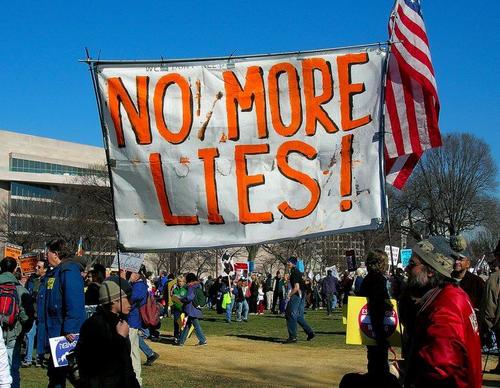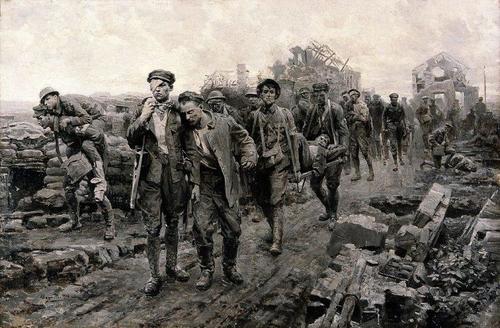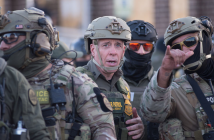Authored by James Bovard via JimBovard.com,
On Memorial Day, the media do their usual sacralizing of war. Instead, it should be a day for the ritualized scourging of politicians.
During the last 70 years, their lies have resulted in the unnecessary deaths of almost 100,000 American soldiers and millions of foreigners. And yet, people still get teary-eyed when politicians take the stage to talk about their devotion to the troops.

On Memorial Day 2011, for instance, the Washington Post included numerous touching photographs of graves, recent widows or fatherless kids by the headstones, and stories of the troops’ sacrifices. The Post buried a short article in the middle of the A-Section (squeezed onto a nearly full-page ad for Mattress Discounters) about the U.S. military killing dozens of Afghan civilians and police in a wayward bombing in some irrelevant Afghan province. The story’s length and placement reflected the usual tacit assumption that any foreigner killed by the U.S. military doesn’t deserve to be treated as fully human.
The Washington Post celebrations of Memorial Day never include any reference to that paper’s culpability in helping the Bush administration deceive America into going to war against Iraq. When Post reporters dug up the facts that exposed the Bush administration’s false claims on the Iraqi peril, editors sometimes ignored or buried their revelations. Washington Post Pentagon correspondent Thomas Ricks complained that in the lead-up to the U.S. invasion of Iraq, “There was an attitude among editors: ‘Look, we’re going to war, why do we even worry about all this contrary stuff?’”
The Post continued aiding the war party by minimizing its sordidness. When the Bush administration’s claims on Iraq’s nuclear-weapons program had collapsed, the Washington Post article on the brazen deceits was headlined, “Depiction of Threat Outgrew Supporting Evidence.” According to Post media columnist Howard Kurtz, the press are obliged to portray politicians as if they are honest. He commented in 2007, “From August 2002 until the war was launched in March of 2003 there were about 140 front-page pieces in the Washington Post making the administration’s case for war. It was, ‘The President said yesterday.’ ‘The Vice President said yesterday.’ ‘The Pentagon said yesterday.’ Well, that’s part of our job. Those people want to speak. We have to provide them a platform. I don’t have [sic]anything wrong with that.”
World War I: Transport of the Wounded. Oil painting by Ugo Matania. https://wellcomeimages.org/indexplus/image/V0018185.html [Wikimedia]
The Post was not alone in its groveling to war. Major television networks behaved like government-owned subsidiaries for much of the period before and during the Iraq War. CNN chief news executive Eason Jordan explained a month after the United States attacked Iraq, “I went to the Pentagon myself several times before the war started and met with important people there and said, for instance, at CNN, ‘Here are the generals we’re thinking of retaining to advise us on the air and off about the war,’ and we got a big thumbs-up on all of them. That was important.” Jessica Yellin, a CNN correspondent who formerly worked for MSNBC, commented in 2008, “When the lead-up to the war began, the press corps was under enormous pressure from corporate executives, frankly, to make sure that this was a war that was presented in a way that was consistent with the patriotic fever in the nation and the president’s high approval ratings.” NBC news anchor Katie Couric stated that there was pressure from “the corporations who own where we work and from the government itself to really squash any kind of dissent or any kind of questioning of it.”
Before the war, almost all the broadcast news stories on Iraq originated with the federal government. PBS’ Bill Moyers noted that “of the 414 Iraq stories broadcast on NBC, ABC, and CBS nightly news, from September 2002 until February 2003, almost all the stories could be traced back to sources from the White House, the Pentagon, and the State Department.”
But this record of servility and deceit has not slackened the media’s enthusiasm to drench Memorial Day with sanctimony.
In reality, Memorial Day should be a time to remember the government’s crimes against the people. Politicians have perennially sent young Americans to die for false causes or on wild-goose chases.
Over the past century, war memorials have become increasingly popular. However, most of the memorials do little or nothing to inform people of the chicaneries or deceits that paved the way to or perpetuated the war. It would be a vast improvement if each war memorial also had an adjacent monument of major lies—such as an engraved plaque listing the major deceits by which the American public were swayed to support sending American boys off to die for some grand cause.
Continue Reading: zerohedge.com





Leave a Reply